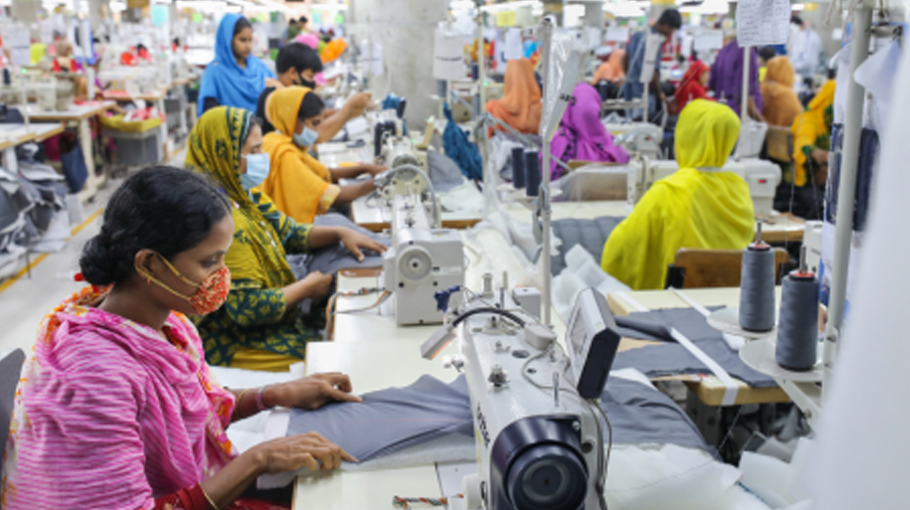ILO for labour law reform to end unrest

The International Labour Organisation (ILO) has called for immediate reforms in wage structures and labour laws in Bangladesh's ready-made garment (RMG) sector to address the ongoing worker grievances and labour unrest.
In a statement issued yesterday (29 September), the organisation stresses that wage restructuring and improved labour protections are crucial for achieving sustainable industrial relations between employers and workers, ensuring both fair wages and long-term peace in the sector.
The ILO said it is closely monitoring labour unrest in the RMG and other sectors, which has brought attention to systemic issues needing urgent resolution.
In its statement, the organisation underlined the importance of social dialogue, urging all stakeholders, employers, workers, and government representatives to engage in constructive discussions to uphold workers' rights while maintaining the economic viability of the industry.
The ILO also commended the RMG industry for the landmark agreement reached on 24 September between workers and employers in the Ashulia area on the outskirts of Dhaka.
This agreement came after days of escalating labour unrest, which has raised hopes for harmonious industrial relations and long-term peace in the sector, it said in the statement.
Social dialogue, which involves collaboration among different stakeholders to find solutions and resolve disputes, is a crucial tool for good governance, reads the ILO statement.
"It not only supports sustainable business practices and better working conditions but also contributes to advancing social justice and decent work for all," it added.
The ILO identified five key areas where action is required:
Wage structure and policy reform: ILO recommended developing an evidence-based, gender-responsive national wage policy is vital for regular and fair wage setting.
It believes reforming the minimum wage mechanism and ensuring inclusive consultations between employers and workers will help address wage-related grievances, including the move towards providing living wages.
It said sectoral wage boards and strong collective bargaining mechanisms must be established to prevent and de-escalate unrest related to wages and working conditions.
Labour law reform and strengthened legal protections: ILO believes amendments to the Bangladesh Labour Act, aligned with international labour standards, are needed to expand coverage to all workers, including those in the informal sector and export processing zones (EPZs).
The reform should strengthen mechanisms for resolving labour disputes, enhance wage protections, and simplify the processes for trade union registration, reads the statement.
A strong national industrial relations system: ILO said a robust and transparent national industrial relations system is essential for addressing disputes early and preventing them from escalating into violence.
This should include the introduction of an independent alternative dispute resolution institution and reforms to the labour court system to improve case management.
It believes addressing anti-union discrimination cases is also a vital step toward promoting industrial peace.
Social protection: ILO said the Employment Injury Scheme, currently piloted for garment workers, should be institutionalised, legislated, and gradually extended to other sectors.
It believes that establishing a comprehensive social protection system, aligned with ILO conventions, will boost workers' safety and well-being while enhancing Bangladesh's global competitiveness.
Occupational safety and health (OSH): The ILO encouraged the Government of Bangladesh to ratify OSH conventions No 155 and No 187 and to develop a comprehensive national OSH system.
The organisation believes this will promote a culture of safety across all sectors of the economy.
The ILO called on all stakeholders to work to improve the industrial relations system through constructive social dialogue. This collaboration is essential not only for the stability of the RMG sector but also for the broader economic and social well-being of Bangladesh, it said.
"Through shared effort and commitment, we are optimistic that peaceful and productive industrial relations can be achieved, benefiting all parties involved," ILO said in its statement.
The statement said ILO Director-General Gilbert F Houngbo met with Dr Muhammad Yunus, the interim government's chief adviser, on 26 September 2024 on the sidelines of the United Nations General Assembly (UNGA) in New York to discuss the interim government's priorities.
The discussions focused on employment creation and labour reforms, and the ILO's role in supporting these initiatives.
In the ILO statement, the organisation said it remains dedicated to supporting Bangladesh on its journey towards sustainable and inclusive economic growth, underpinned by the promotion of decent work, labour rights, and social justice.




